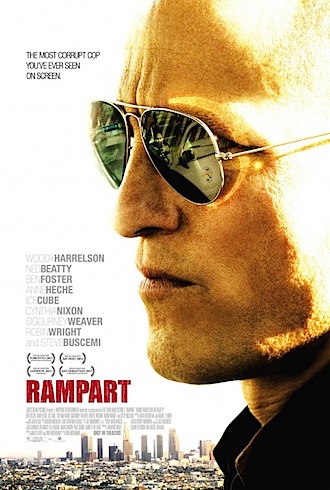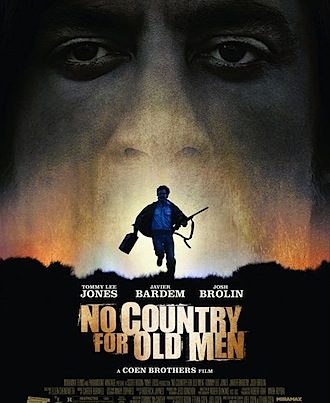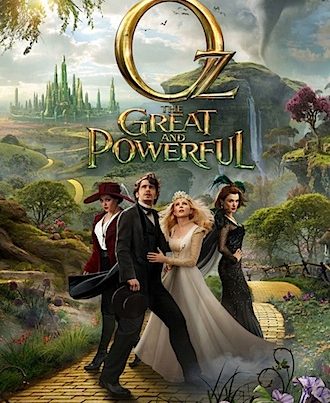It’s extremely quiet in terms of new releases in cinemas at the moment. The major international distributors are keeping well clear of the overwhelming force that will be The Dark Knight Rises and the indies know that all the arthouse money is going into film festival tickets.
This year – for a change – I’m not booking in advance for anything. There’s so much goodness in the programme – and my faith in serendipity needs a bit of a boost – that I’ll just see what happens to be playing whenever I get a spare moment and then give it a go. With well over 150 individual films and short programmes to choose from I’m sure there’ll always be something on that’s going to challenge and enlighten me.
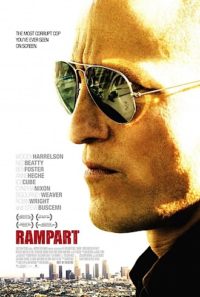 It helps that, thanks to festival management, I’ve already seen ten of what’s on offer – ten films that might be easy to miss when flicking from one end of the 80 page book to the other. In Rampart, Woody Harrelson finally lays to rest the ghosts of Cheers with a lacerating performance as an LA cop who’s as tormented and corrupted as Harvey Keitel’s legendary Bad Lieutenant. Collaborating once again with writer-director Oren Moverman (the brilliant and under-seen The Messenger), Harrelson plays a character so awful that 108 minutes later you are amazed to find you actually care about him.
It helps that, thanks to festival management, I’ve already seen ten of what’s on offer – ten films that might be easy to miss when flicking from one end of the 80 page book to the other. In Rampart, Woody Harrelson finally lays to rest the ghosts of Cheers with a lacerating performance as an LA cop who’s as tormented and corrupted as Harvey Keitel’s legendary Bad Lieutenant. Collaborating once again with writer-director Oren Moverman (the brilliant and under-seen The Messenger), Harrelson plays a character so awful that 108 minutes later you are amazed to find you actually care about him.
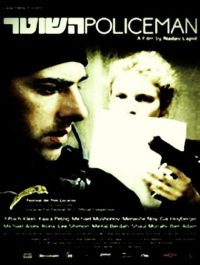 You’ll find another troubled cop in Nadav Lapid’s Policeman in which naïve bourgeois revolutionaries meet a cynical and corrupted anti-terrorist squad in what turns out to be a devastating indictment of modern Israel. While the cops are persuading one of their crew who is dying of cancer to take the fall for a botched raid in which innocent children died, a bunch of upper-middle class activists plan to kidnap a billionaire industrialist to make a point about … something. A slow burner.
You’ll find another troubled cop in Nadav Lapid’s Policeman in which naïve bourgeois revolutionaries meet a cynical and corrupted anti-terrorist squad in what turns out to be a devastating indictment of modern Israel. While the cops are persuading one of their crew who is dying of cancer to take the fall for a botched raid in which innocent children died, a bunch of upper-middle class activists plan to kidnap a billionaire industrialist to make a point about … something. A slow burner.
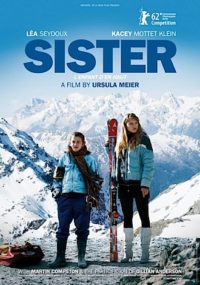 Ursula Meier’s Sister seems like a sibling to The Dardennes’ The Kid With a Bike. 12-year-old Simon (Kacey Mottet Klein) is a thief, raiding the lockers and unattended kit of the well-to-do at the top of the mountain and selling it down at the bottom. Meanwhile, his erratic older sister (Léa Seydoux) can’t keep a job and – for reasons that will become clear – isn’t particularly interested in caring for her younger brother. A heartbreaking little story set against some stunning alpine scenery.
Ursula Meier’s Sister seems like a sibling to The Dardennes’ The Kid With a Bike. 12-year-old Simon (Kacey Mottet Klein) is a thief, raiding the lockers and unattended kit of the well-to-do at the top of the mountain and selling it down at the bottom. Meanwhile, his erratic older sister (Léa Seydoux) can’t keep a job and – for reasons that will become clear – isn’t particularly interested in caring for her younger brother. A heartbreaking little story set against some stunning alpine scenery.
 There’s more scenery on offer in Julian Roman Pöisler’s The Wall but our protagonist (Martina Gedeck) is trapped inside it. One morning she wakes up to find herself stuck behind an invisible wall that surrounds the lodge where she’s been staying. Everything on the outside has come to a mysterious halt and the only living things that remain are her pets and a cow. “We’re born alone and we die alone” is one reading of this engrossing existential fable.
There’s more scenery on offer in Julian Roman Pöisler’s The Wall but our protagonist (Martina Gedeck) is trapped inside it. One morning she wakes up to find herself stuck behind an invisible wall that surrounds the lodge where she’s been staying. Everything on the outside has come to a mysterious halt and the only living things that remain are her pets and a cow. “We’re born alone and we die alone” is one reading of this engrossing existential fable.
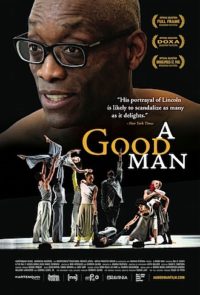 Documentaries about the creative process don’t come much better than Bob Hercules and Gordon Quinn’s A Good Man (made originally for PBS in the US). Choreographer and dancer Bill T. Jones is as feisty in his own field as Spike Lee and we see all sides of his mercurial personality as he struggles to make a profoundly personal dance work inspired by the bicentenary of Abraham Lincoln’s birth. Brilliantly insightful about so many things – race, politics, history, mythology and art – Jones doesn’t pretend to have all the answers and that he isn’t wrestling every day with his insecurities as well as his passions. “I don’t want to be saint. I want to be a two-fisted maker,” he exclaims at one point and what wonderful ambition to still have at 60.
Documentaries about the creative process don’t come much better than Bob Hercules and Gordon Quinn’s A Good Man (made originally for PBS in the US). Choreographer and dancer Bill T. Jones is as feisty in his own field as Spike Lee and we see all sides of his mercurial personality as he struggles to make a profoundly personal dance work inspired by the bicentenary of Abraham Lincoln’s birth. Brilliantly insightful about so many things – race, politics, history, mythology and art – Jones doesn’t pretend to have all the answers and that he isn’t wrestling every day with his insecurities as well as his passions. “I don’t want to be saint. I want to be a two-fisted maker,” he exclaims at one point and what wonderful ambition to still have at 60.
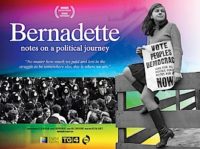 Equally passionate – and equally likely to infuriate her colleagues as well as her enemies – is Bernadette Devlin McAliskey, once the firebrand socialist leader of the Northern Irish Catholic resistance to British rule in the late 60s and early 70s, now a committed community worker striving to improve the lives of those same people. While a lot of the heavy lifting in the documentary is done by ten years of interviews with McAliskey herself, the film (Bernadette: Notes on a Political Journey) is illustrated with plenty of archive footage reminding us what terrible times those “troubles” were.
Equally passionate – and equally likely to infuriate her colleagues as well as her enemies – is Bernadette Devlin McAliskey, once the firebrand socialist leader of the Northern Irish Catholic resistance to British rule in the late 60s and early 70s, now a committed community worker striving to improve the lives of those same people. While a lot of the heavy lifting in the documentary is done by ten years of interviews with McAliskey herself, the film (Bernadette: Notes on a Political Journey) is illustrated with plenty of archive footage reminding us what terrible times those “troubles” were.
Wellington is represented in its own festival by two features and at least one feature documentary. I’ll be looking at the dystopian drama Existence next week and you can read my thoughts about How to meet Girls From a Distance in the programme itself. (It’s the first time I’ve been asked to contribute a programme note – does that compromise me?)
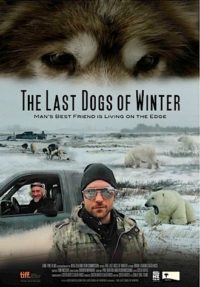 In The Last Dogs of Winter, Wellington documentarian Costa Botes contributes a smashing story that does what all documentaries should do – tells you something you didn’t know before and makes it compelling. In remote and freezing Churchill, Manitoba, Brian Ladoon breeds and fiercely protects the last of an endangered species – the Eskimo dog. Bred as sled dogs to pull the only possible form of transportation in the snowy Arctic Circle, they’ve been made redundant by the petrol engine and now there are only a few left. Churchill is also the polar bear capital of the world and the three species (man, dog and bear) live in uneasy harmony as society and the climate change around them.
In The Last Dogs of Winter, Wellington documentarian Costa Botes contributes a smashing story that does what all documentaries should do – tells you something you didn’t know before and makes it compelling. In remote and freezing Churchill, Manitoba, Brian Ladoon breeds and fiercely protects the last of an endangered species – the Eskimo dog. Bred as sled dogs to pull the only possible form of transportation in the snowy Arctic Circle, they’ve been made redundant by the petrol engine and now there are only a few left. Churchill is also the polar bear capital of the world and the three species (man, dog and bear) live in uneasy harmony as society and the climate change around them.
There was a time years ago when it seemed like every feature in the festival had a short playing before it but those days are mostly over. 16 play ahead of feature screenings this year, but the other way to see shorts on the big screen is via the animation and Māori and Pasifika programmes or – this year’s innovation – New Zealand’s Best 2012. Six films compete for three prizes and you can see all six at two special Paramount screenings and then vote for the audience favourite award. Look out for Michelle Savill’s Ellen Is Leaving – a wistful rumination on change featuring a cast of young Wellington luminaries – and Sam Kelly’s Lambs – a slice of kiwi social realism with some profound moments.
The New Zealand International Film Festival kicks off in Auckland this Thursday (19 July) and in Wellington on the 27th.
Printed in Wellington’s Capital Times on Wednesday 18 July, 2012.

